Ditapis dengan

E-book Artifacts of Thinking: Reading Hannah Arendt's "Denktagebuch"
'Artifacts of Thinking: Reading Arendt’s 'Denktagebuch'' offers a path through Hannah Arendt’s recently published 'Denktagebuch', or 'Book of Thoughts.' In this book a number of innovative Arendt scholars come together to ask how we should think about these remarkable writings in the context of Arendt’s published writing and broader political thinking. Unique in its form, the 'Denktagebuc…
- Edisi
- -
- ISBN/ISSN
- 9780823272174
- Deskripsi Fisik
- -
- Judul Seri
- -
- No. Panggil
- 193 BER a
E-book Emotional and Ecological Literacy for a More Sustainable Society
The 2030 Agenda for Sustainable Development, adopted by the United Nations in 2015 (hereinafter Agenda 2030),1 marks a global milestone in the commitment to addressing imperative sustainability issues such as ending poverty, overcoming food insecurity, reversing climate change impacts, and reversing inequality and injustice.2 At the core of the Agenda …
- Edisi
- -
- ISBN/ISSN
- 9783031567728
- Deskripsi Fisik
- 217 hlm
- Judul Seri
- -
- No. Panggil
- 327.1 AKA e

E-book Liberals, Conservatives, and Mavericks: On Christian Churches of Easte…
No Church is monolithic—this is the preliminary premise of this volume on the public place of religion in a representative number of post-communist countries. The studies confirm that within any religious organization we can expect to find fissures, factions, theological or ideological quarrels, and perhaps even competing interest groups, such as missionary workers, regular clergy versus secu…
- Edisi
- -
- ISBN/ISSN
- 9789633864579
- Deskripsi Fisik
- 443 halaman, ilus.
- Judul Seri
- -
- No. Panggil
- 274 CIB l

E-book Reconstructing Lenin: An Intellectual Biography
Vladimir Ilyich Lenin is among the most enigmatic and influential figures of the twentieth century. While his life and work are crucial to any understanding of modern history and the socialist movement, generations of writers on the left and the right have seen fit to embalm him endlessly with superficial analysis or dreary dogma. Now, after the fall of the Soviet Union and “actually-existing…
- Edisi
- -
- ISBN/ISSN
- 9781583674499
- Deskripsi Fisik
- 564 halaman, ilus.
- Judul Seri
- -
- No. Panggil
- 923.2 KRA r
E-book Politics: A Very Short Introduction
In A Very Short Introduction to Politics, Kenneth Minogue begins with a discussion of issues arising from a historical account of politics, and goes on to offer chapters dealing with the Ancient Greeks and the idea of citizenship; Roman law; medieval Christianity and individualism; freedom since Machiavelli and Hobbes; the challenge of ideologies; democracy, oligarchy, and bureaucracy; power an…
- Edisi
- -
- ISBN/ISSN
- 9780192853882
- Deskripsi Fisik
- 128 halaman
- Judul Seri
- -
- No. Panggil
- 320 MIN p
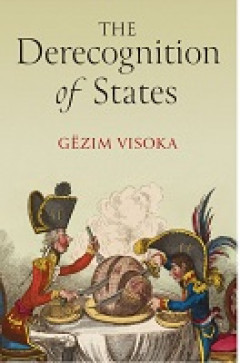
E-book The Derecognition of States
Although a great deal is known about the recognition of states, less is known about the practice of derecognition of states, namely why and how states withdraw the recognition of other contested and partially recognized states. The Derecognition of States offers a global and comparative outlook of this unexplored diplomatic practice. Using original empirical research, it addresses the complex p…
- Edisi
- -
- ISBN/ISSN
- 9780472077090
- Deskripsi Fisik
- 299 halaman
- Judul Seri
- -
- No. Panggil
- 327.2 VIS t
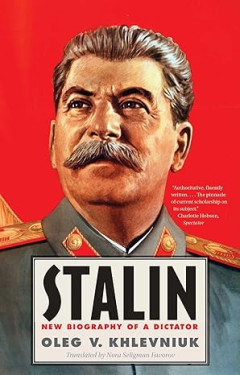
E-book Stalin: New Biography of a Dictator
osef Stalin exercised supreme power in the Soviet Union from 1929 until his death in 1953. During that quarter-century, by Oleg Khlevniuk’s estimate, he caused the imprisonment and execution of no fewer than a million Soviet citizens per year. Millions more were victims of famine directly resulting from Stalin's policies. What drove him toward such ruthlessness? This essential biography, by t…
- Edisi
- -
- ISBN/ISSN
- 9780300219784
- Deskripsi Fisik
- 429 halaman
- Judul Seri
- -
- No. Panggil
- 923.2 KHL s
E-book Floundering Stability : US Foreign Policy in Egypt
King George III of Great Britain and Ireland’s opening parliamentary address emphasized his personal connection to the country and commit-ment to the “excellent constitution” that laid out ties between the monar-chy and legislature.1 While the king and parliament held different ideas for governance, both seats of power agreed that Britain’s colonies should fall unde…
- Edisi
- -
- ISBN/ISSN
- 9780472903207
- Deskripsi Fisik
- 203 hlm
- Judul Seri
- -
- No. Panggil
- 327.1 KAM f

E-book Political Islam, World Politics and Europe: From Jihadist to Instituti…
The new and updated edition of Political Islam, World Politics and Europe focusses on the shift within political Islam, in light of 9/11 and the events of the Arab Spring, from a jihadist struggle, to institutional Islamism. Refuting what has often been referred to by commentators as the ‘moderation,’ of Islamism, the second edition of this book introduces the concept of ‘institutional…
- Edisi
- -
- ISBN/ISSN
- 9780415730488
- Deskripsi Fisik
- 395 halaman
- Judul Seri
- -
- No. Panggil
- 297.272 TIB p
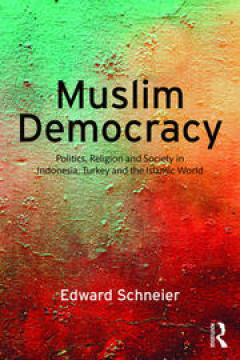
E-book Muslim Democracy: Politics, Religion and Society in Indonesia, Turkey …
Muslim Democracy explores the relationship between politics and religion in forty-seven Muslim-majority countries, focusing especially on those with democratic experience, such as Indonesia and Turkey, and drawing comparisons with their regional, non-Islamic counterparts.? Unlike most studies of political Islam, this is a politically-focused book, more concerned with governing realties than ide…
- Edisi
- -
- ISBN/ISSN
- 9781138928121
- Deskripsi Fisik
- 279 halaman
- Judul Seri
- -
- No. Panggil
- 297.27 SCH m
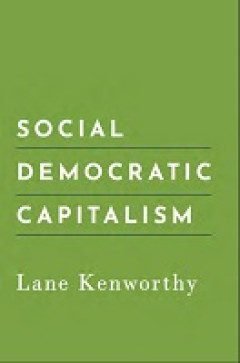
E-book Social Democratic Capitalism
What configuration of institutions and policies is most conducive to human flourishing? The historical and comparative evidence suggests that the answer is social democratic capitalism — a democratic political system, a capitalist economy, good elementary and secondary schooling, a big welfare state, pro-employment public services, and moderate regulation of product and labor markets. Lane Ke…
- Edisi
- -
- ISBN/ISSN
- 9780190064112
- Deskripsi Fisik
- 305 halaman
- Judul Seri
- -
- No. Panggil
- 320.12 KEN s
E-book Global Political Demography : The Politics of Population Change
Political demography, or the systematic study of population changeand politics, public policies and polities, sees population dynamics (struc-ture and change) as one of the main drivers of politics at the meso-and macro-level. As an approach, it can be defined as the study of thedynamics in the size, composition and distribution of populations andtheir effects on political and policy processes.…
- Edisi
- -
- ISBN/ISSN
- 9783030730659
- Deskripsi Fisik
- 472 hlm
- Judul Seri
- -
- No. Panggil
- 320.07 BAL g
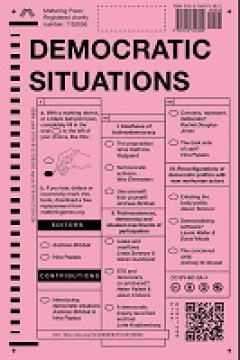
E-Book Democratic Situations
Democratic Situations challenges researchers and students in Science & Technology Studies and related fields to treat democracy as an empirical phenomenon. This means leaving behind off-the-shelf theoretical notions of democracy that may have travelled into STS unexamined. The alternative strategy pursued in this volume is to pay as much analytical attention to the study of democratic politics …
- Edisi
- -
- ISBN/ISSN
- 9781912729302
- Deskripsi Fisik
- 274 halaman
- Judul Seri
- -
- No. Panggil
- 320 BIR d
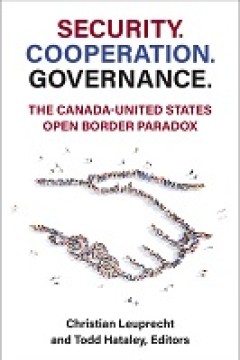
E-Book Security. Cooperation. Governance.: The Canada-United States Open Bord…
Historically, national borders have evolved in ways that serve the interests of central states in security and the regulation of trade. This volume explores Canada–US border and security policies that have evolved from successive trade agreements since the 1950s, punctuated by new and emerging challenges to security in the twenty-first century. The sectoral and geographical diversity of cross…
- Edisi
- -
- ISBN/ISSN
- 9780472075713
- Deskripsi Fisik
- 233 halaman
- Judul Seri
- -
- No. Panggil
- 320 LEU s

E-Book European Actorness in a Shifting Geopolitical Order: European Strategi…
This is an open access book. With the unprovoked Russian invasion of Ukraine, European security has been put on high alert. The implications of the Russian military invasion are many and difficult to grasp in full. However, the need for greater European strategic autonomy appears increasingly evident. The book argues that strategic autonomy may be reached—also in the short run—if differenti…
- Edisi
- -
- ISBN/ISSN
- 9783031445460
- Deskripsi Fisik
- 133 halaman
- Judul Seri
- -
- No. Panggil
- 320.01 RIE e

E-Book Preventing Mass Human-Rights Violations and Atrocity Crimes
The problem of preventing mass human-rights violations and atrocity crimes is one of the key issues in international relations. The book presents the capacity of the international community in the field. The available instruments of early warning, preventive diplomacy as well as legal, economic, and military measures of prevention are included. Cases of Chechnya, Rwanda, Côte d'Ivoire and Liby…
- Edisi
- -
- ISBN/ISSN
- 9783631868102
- Deskripsi Fisik
- 244 halaman
- Judul Seri
- -
- No. Panggil
- 341 BIE p
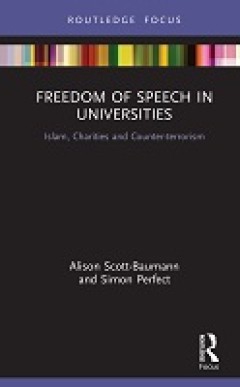
E-Book Freedom of Speech in Universities: Islam, Charities and Counter-terrorism
Freedom of speech and extremism in university campuses are major sources of debate and moral panic in the United Kingdom today. In 2018, the Joint Committee on Human Rights in Parliament undertook an inquiry into freedom of speech on campus. It found that much of the public concern is exaggerated, but identified a number of factors that require attention, including the impact of government coun…
- Edisi
- -
- ISBN/ISSN
- 9780367257828
- Deskripsi Fisik
- 152 halaman
- Judul Seri
- -
- No. Panggil
- 297.272 SCO f

E-Book 2050 China: Becoming a Great Modern Socialist Country
This book is open access under a CC BY-NC-ND 4.0 license. This book is arranged and developed around the theme of “2050 China,” it analyzes the factors and advantages of the Chinese road to socialist modernization, explores and summarizes the development goal and the basic logic of the socialist modernization of China, and further shows the general basis of the primary stage of socialism. A…
- Edisi
- -
- ISBN/ISSN
- 9789811598333
- Deskripsi Fisik
- 105 halaman
- Judul Seri
- -
- No. Panggil
- 320.5 ANG t

E-Book Calculated Nationalism in Contemporary South Korea
Nationalism in a nation-state reflects its emergent structural, cultural, and personal properties at a given time. In the politico-historical context of South Korea and the globe, the fruits of the 1968 Revolution in France could not reach Korean society under its military regime and exploitative economic structure. This continued to frustrate the grassroots and especially social actors in Sout…
- Edisi
- -
- ISBN/ISSN
- 9789463723657
- Deskripsi Fisik
- 310 halaman
- Judul Seri
- Movements for Political and Economic Democratization in the 21st Century
- No. Panggil
- 951.9 HAN c
E-book Politicizing Digital Space: Theory, the Internet, and Renewing Democracy
n the wake of the so-called ‘Arab Spring,’ Occupy, and Anonymous move-ments, attention has increasingly been paid to the intersection of politics and the internet. In the popular media, commentators such as Roger Cohen of the New York Times took a technological determinist approach, as he declared Face-book founder Mark Zuckerberg to be the true leader of the protests spreading a…
- Edisi
- -
- ISBN/ISSN
- 9781911534419
- Deskripsi Fisik
- 155 hlm
- Judul Seri
- -
- No. Panggil
- 324.7 SMI p
E-book Natural Law : A Translation of the Textbook for Kant’s Lectures on L…
s the first translation into any modern language of Achenwall’sIus naturae, from the 1763 edition used by Immanuel Kant, this open access book is an essential work for students and Kant scholars. For over twenty years, Kant used this book as the basis for his lectures on natural law. It has influenced his legal and political philosophy, as well as his ethics, and is indispensable for understa…
- Edisi
- -
- ISBN/ISSN
- 9781350022867
- Deskripsi Fisik
- -
- Judul Seri
- -
- No. Panggil
- 189 ACH n
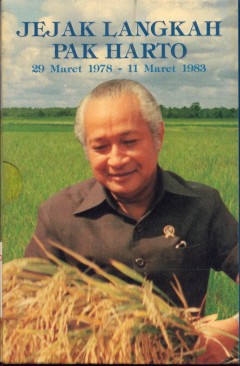
Jejak Langkah Pak Harto 29 Maret 1978-11 Maret 1983
- Edisi
- -
- ISBN/ISSN
- 979-8085-09-4
- Deskripsi Fisik
- xxiii+317 p. 14 cm x21 cm
- Judul Seri
- -
- No. Panggil
- 959.8036 Soe j
- Edisi
- -
- ISBN/ISSN
- 979-8085-09-4
- Deskripsi Fisik
- xxiii+317 p. 14 cm x21 cm
- Judul Seri
- -
- No. Panggil
- 959.8036 Soe j
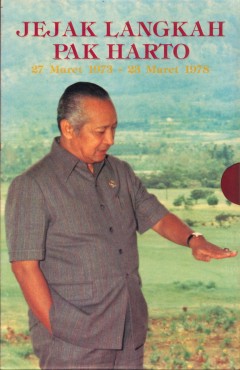
Jejak Langkah Pak Harto 27 Maret 1973-23 Maret 1978
- Edisi
- -
- ISBN/ISSN
- 979-8085-07-8
- Deskripsi Fisik
- xxiii+532 hlm. , 14cm x21 cm
- Judul Seri
- -
- No. Panggil
- 959.8036 Soe j
- Edisi
- -
- ISBN/ISSN
- 979-8085-07-8
- Deskripsi Fisik
- xxiii+532 hlm. , 14cm x21 cm
- Judul Seri
- -
- No. Panggil
- 959.8036 Soe j
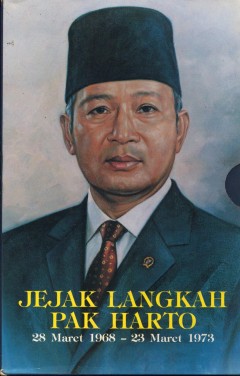
Jejak Langkah Pak Harto 28 Maret 1968-23 Maret 1973
- Edisi
- -
- ISBN/ISSN
- 979-8085-04-3
- Deskripsi Fisik
- xix, 532 p. , 14cm x 21 cm
- Judul Seri
- -
- No. Panggil
- 959.8036 Soe j
- Edisi
- -
- ISBN/ISSN
- 979-8085-04-3
- Deskripsi Fisik
- xix, 532 p. , 14cm x 21 cm
- Judul Seri
- -
- No. Panggil
- 959.8036 Soe j
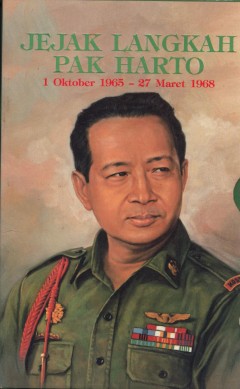
Jejak Langkah Pak Harto 1 Oktober 1965-27 Maret 1968
- Edisi
- -
- ISBN/ISSN
- 979-8085-03-5
- Deskripsi Fisik
- xv, 317 hlm. 14 cm x 21 cm
- Judul Seri
- -
- No. Panggil
- 959.8036 TIM j
- Edisi
- -
- ISBN/ISSN
- 979-8085-03-5
- Deskripsi Fisik
- xv, 317 hlm. 14 cm x 21 cm
- Judul Seri
- -
- No. Panggil
- 959.8036 TIM j
 Karya Umum
Karya Umum  Filsafat
Filsafat  Agama
Agama  Ilmu-ilmu Sosial
Ilmu-ilmu Sosial  Bahasa
Bahasa  Ilmu-ilmu Murni
Ilmu-ilmu Murni  Ilmu-ilmu Terapan
Ilmu-ilmu Terapan  Kesenian, Hiburan, dan Olahraga
Kesenian, Hiburan, dan Olahraga  Kesusastraan
Kesusastraan  Geografi dan Sejarah
Geografi dan Sejarah